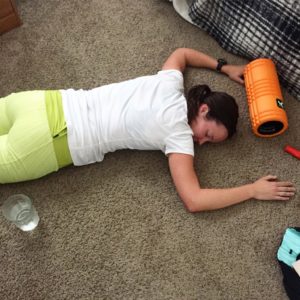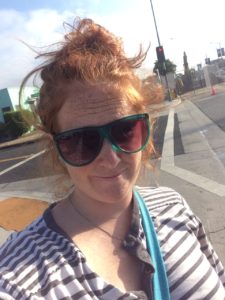- Calls to this hotline are currently being directed to Within Health, Fay or Eating Disorder Solutions
- Representatives are standing by 24/7 to help answer your questions
- All calls are confidential and HIPAA compliant
- There is no obligation or cost to call
- Eating Disorder Hope does not receive any commissions or fees dependent upon which provider you select
- Additional treatment providers are located on our directory or samhsa.gov
Recovery Sunglasses: Block Out Your Eating Disorder for Good

By Ashley Holt, in response to “Could You Be Wearing Eating Disorder Sunglasses?” by Jennifer Rollin, MSW, LCSW-C [1]
“What weird thing are you doing with your pancakes right now, Ashley?” my dietitian shot out of the corner of her mouth. The tone was a stern, Pull it together!, though the volume was thankfully subtle. “I … um … I …” was what fumbled out of my mouth until she cut me off saying, “Is this about the butter again?!”
The Bumpy Road to Eating Disorder Recovery
It was a fairly long and complicated series of events over the previous ten-ish years of my life which led me to that fateful breakfast outing.
Before, I would have scoffed judgmentally at the idea of even eating breakfast, let alone going out for breakfast. But then, suddenly, I was at a family-style restaurant table in Brentwood, California, with a handful of other people around my age – some fellow clients and some providers – at a Treatment Center Mandated Breakfast Outing. With pancakes.
Jennifer Rollin, MSW, LCSW-C, really nailed it in her article “Could You Be Wearing Eating Disorder Sunglasses?” that one should practice separating out the eating disorder self from the healthy self [1]. However, I was at a point where I needed to take this concept just a little bit further in my recovery.

Just to even get to that pivotal breakfast outing in my second round of intensive treatment, I had needed to make significant progress in my recovery. It took some time and practice to even realize or believe that I had a healthy self in there somewhere.
At first, it wasn’t easy to admit that I (my healthy self) really was hungry, and I (my healthy self) really did want to eat pizza on some level. I continued to strengthen and expand that skill upon it in order to discern when I was getting internal feedback from my eating disorder self, and when I was getting internal feedback from my healthy self (or soul self, as I learned to call it).
We wrote out dialogues between the two entities – secret ones in our journals and our private thoughts, and less terrifying ones to share with our peers in group therapy. We wrote letters to them. They wrote letters to us. I think they even wrote letters to each other.
And I know for me, when I give my eating disorder self an inch of leverage in my life and decision making, it will actually take a finisher’s ribbon in that day’s local marathon. My support team and I needed to come up with a more specific way to directly obstruct the path of my eating disorder self. It simply couldn’t have any power in my thoughts or choices.
Finding Strength in Wearing Your Recovery Sunglasses
“ Put on your recovery sunglasses, please, Ashley,” my dietitian hissed at me from across the table.
Put on your recovery sunglasses, please, Ashley,” my dietitian hissed at me from across the table.
She was right. We had talked about this before. At this point, even a few of my fellow clients knew my code word for this situation.
The recovery sunglasses served to remind me that I actually do have a choice in my actions. My dietitian knew that I could list off all of the most important aspects of recovery in alphabetical order. She knew that I used my healthy self regularly to support my fellow clients in treatment whom I had grown to deeply care for.
I didn’t need more complex scientific discussions about what exactly a kilocalorie is, why the brain desperately needs fats and carbohydrates to function properly, or how every individual body has a “set point” weight that it will go to great lengths to maintain. What I actually needed was to eat the food. I needed to show up, put on my recovery sunglasses, and just eat the pancakes and eggs alongside my comrades who were battling for their lives with everything they had.
Even though the dietitian had said that people who got pancakes only had to eat half of the butter served if they didn’t want the rest, and my pancakes had been delivered to the table three whole minutes later than the other plates and so the butter had melted and infused itself in its entirety into my pancakes before I had the opportunity to remove the non-required half of the butter ball, I grabbed my ridiculously cheap and tacky recovery sunglasses off of my head and placed them over my eyes. And I ate my freakin’ breakfast.
 About the Author: Ashley Holt has had first hand experience in the world of eating disorders and recovery for about fifteen years. She has been to various treatment centers throughout her recovery experience, most recently in Portland, Oregon in 2015.
About the Author: Ashley Holt has had first hand experience in the world of eating disorders and recovery for about fifteen years. She has been to various treatment centers throughout her recovery experience, most recently in Portland, Oregon in 2015.
Currently, Ashley is pursuing her master’s in Special Education in order to teach high schoolers with significant disabilities how to communicate, read, and make friends. She balances this with her (very) newly developing yoga practice, spending plenty of time outdoors, and most recently, becoming an advocate in the recovery community. Visit Ashley Holt’s Blog.
References:
[1]: Rollins, J. (2017, June 14). Could You Be Wearing ‘Eating Disorder Sunglasses?’ Retrieved June 30, 2017, from http://www.huffingtonpost.com/entry/could-you-be-wearing-eating-disorder-sunglasses_us_59416d72e4b0d99b4c92108bThe opinions and views of our guest contributors are shared to provide a broad perspective of eating disorders. These are not necessarily the views of Eating Disorder Hope, but an effort to offer discussion of various issues by different concerned individuals.
We at Eating Disorder Hope understand that eating disorders result from a combination of environmental and genetic factors. If you or a loved one are suffering from an eating disorder, please know that there is hope for you, and seek immediate professional help.
Published on July 3, 2017.
Reviewed By: Jacquelyn Ekern, MS, LPC on July 3, 2017.
Published on EatingDisorderHope.com

The EatingDisorderHope.com editorial team comprises experienced writers, editors, and medical reviewers specializing in eating disorders, treatment, and mental and behavioral health.

